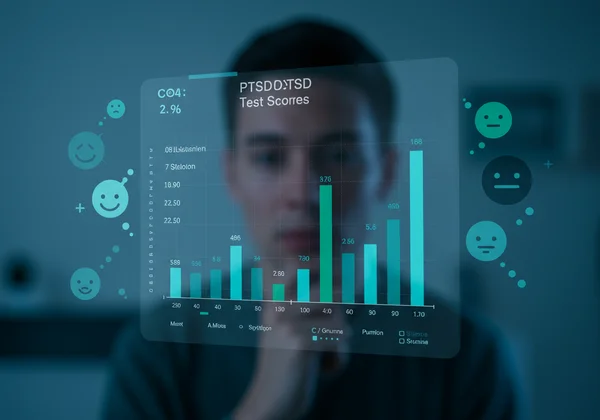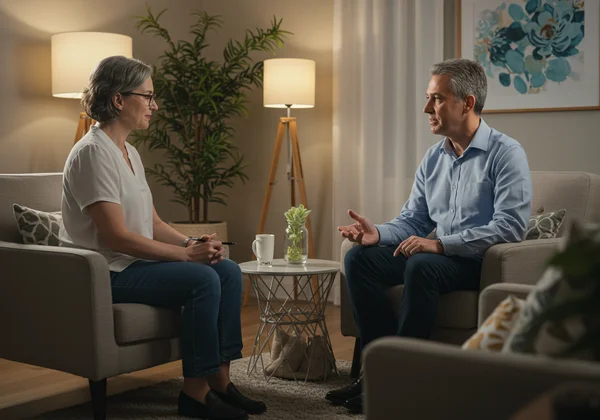PTSD Test Results: What They Mean & Your Next Steps
July 13, 2025 | By Henry Davis
Taking a PTSD test is a courageous first step towards understanding your mental health. If you've just completed one, you're likely eager to know what your PTSD test results signify and what comes next. You might even be asking, 'Are these results truly reflective of my experience?' This article will guide you through interpreting your score, clarifying the nature of online screening tools, and outlining responsible, empowering next steps on your journey to healing. Recognizing the signs is the initial step, and platforms like ours offer a confidential and accessible way to begin this journey. To start your own assessment, consider visiting take a test.
Interpreting Your PTSD Test Score
Understanding your PTSD test results is about gaining clarity, not a definitive label. These tests are designed to provide a snapshot of your current symptoms and how they might align with Post-Traumatic Stress Disorder criteria. It's a foundational step in your self-discovery process, offering valuable insights into your emotional landscape.
Understanding What a PTSD Test Measures
An online PTSD test, particularly those based on scientifically validated scales like the PCL-5 (PTSD Checklist for DSM-5), measures the severity and frequency of symptoms associated with PTSD. These symptoms typically fall into clusters: re-experiencing the trauma (e.g., flashbacks, nightmares), avoidance (e.g., avoiding thoughts, feelings, or places related to the trauma), negative changes in thoughts and mood (e.g., negative beliefs, detachment, anhedonia), and changes in arousal and reactivity (e.g., irritability, hypervigilance). Our free PTSD test tool provides a comprehensive PTSD assessment test based on these accepted standards. It aims to offer a reliable preliminary evaluation of your trauma experience.
Your Score: A Guide, Not a Diagnosis
Remember, any PTSD test score from an online tool serves as a guide, not a formal clinical diagnosis. Only a qualified mental health professional can provide that. Think of it as a helpful screening test that indicates whether your current experiences suggest a need for further evaluation. This initial assessment is designed to empower you with information, helping you decide if exploring professional support is the right next step PTSD. Our platform emphasizes confidentiality and aims to provide a safe space for self-reflection.
What Different Score Ranges May Indicate
While exact score interpretations can vary, generally, higher scores on a PTSD assessment test indicate a greater number and severity of symptoms consistent with PTSD.
- Low Scores: May suggest that while you might have experienced trauma, your current symptoms do not strongly align with PTSD criteria. This doesn't invalidate your feelings but might point to other forms of emotional distress.
- Moderate Scores: Could mean you are experiencing some significant symptoms that warrant attention and possibly further discussion with a professional. These scores suggest that the psychological impact of your experiences might be affecting your daily life.
- High Scores: Strongly suggest that your symptoms are consistent with PTSD and that seeking professional evaluation is highly recommended. This indicates a potential need for immediate support and a clear path toward healing.
Your score, whatever it may be, is a starting point. Simply acknowledging your feelings and taking steps to understand your mental health is a significant achievement. If you're curious about how our tool works, or wish to explore your ptsd test online results, click to start your self test.

Your Actionable Next Steps After a PTSD Test
Once you have your PTSD test results, the question of what to do after a PTSD test naturally arises. This is where the journey transitions from self-assessment to potential action, focusing on proactive steps for your well-being.
When & Why to Seek Professional Support
If your PTSD self test results indicate a moderate to high likelihood of PTSD symptoms, or if your symptoms are significantly impacting your daily life, relationships, or work, seeking professional help is the most responsible and effective course of action. A mental health professional, such as a psychologist or psychiatrist, can conduct a thorough evaluation, offer an accurate diagnosis, and recommend appropriate treatment plans. These might include therapy modalities like Cognitive Behavioral Therapy (CBT) or Eye Movement Desensitization and Reprocessing (EMDR), which are highly effective for trauma recovery. Early intervention can significantly improve your chances of healing and managing your symptoms.

Preparing for a Conversation with a Professional
Preparing for a consultation can make the experience more productive. When you're ready to discuss your test for PTSD results with a professional, consider these tips:
- Bring your results: Share your PTSD test results from our platform. While not a diagnosis, they offer a valuable starting point for discussion.
- List your symptoms: Detail the specific PTSD symptoms you've experienced, including when they started, how often they occur, and how they affect you.
- Describe your trauma: Briefly explain the traumatic event(s) that led to your symptoms.
- Prepare questions: Ask about potential diagnoses, treatment options, and what to expect from therapy.
Remember, this conversation is about collaboration. You are taking an active role in your recovery journey.
Embracing Self-Care and Building Your Support System
Beyond professional guidance, self-care plays a vital role in managing PTSD symptoms and enhancing overall well-being. Simple practices can make a difference:
- Mindfulness and Grounding: Techniques like deep breathing or focusing on your five senses can help with coping during moments of distress.
- Physical Activity: Regular exercise can reduce stress and improve mood.
- Healthy Lifestyle: Prioritize sleep, nutrition, and hydration.
- Connect with Others: Build a strong support system by reaching out to trusted friends, family, or support groups. Sharing your experiences can lessen feelings of isolation.
- Limit Triggers: Identify and, where possible, reduce exposure to things that trigger your symptoms.
These strategies, combined with professional guidance, form a holistic approach to managing trauma and fostering resilience. If you are looking for a reliable way to get started, feel free to take our free test.

Empowering Your Journey Towards Healing
Understanding your PTSD test results is a powerful first step on your path toward healing. It represents a commitment to your mental health and a brave acknowledgement of your experiences. Remember, our platform is designed to provide a confidential starting point for self-understanding, offering immediate insights into potential PTSD symptoms. Our optional AI-driven personalized analysis report can provide even deeper insights into your personal strengths, challenges, and actionable advice, serving as a unique advantage compared to other basic screening tools.
Your journey is unique, and taking control of your narrative begins with self-awareness. Whether your results prompt you to seek professional help, explore self-care strategies, or simply learn more, every action you take is a step forward. Embrace this journey with courage and compassion for yourself. For more resources and to begin your free PTSD test, we invite you to visit our homepage.
Frequently Asked Questions About Your PTSD Test Results
Many users have similar questions after taking a PTSD assessment test. Here are some common inquiries to provide further clarity and guidance.
How Accurate Are Online PTSD Tests?
Online PTSD screening test tools, especially those based on recognized clinical standards like the PCL-5, can be highly accurate as initial screening instruments. They are designed to identify patterns of symptoms that suggest the presence of PTSD. However, they are not diagnostic tools. Their purpose is to indicate whether your experiences align with common trauma symptoms, encouraging you to seek professional help for a definitive diagnosis. Our online PTSD test aims to provide a reliable and confidential first step in your self-assessment. For a deeper understanding of your potential symptoms, try our assessment.
What Happens If PTSD Is Left Untreated?
If PTSD is left untreated, its symptoms can intensify and significantly impact various aspects of a person's life. This can include chronic emotional distress, difficulty maintaining relationships, impaired work or school performance, increased risk of substance abuse, and development of other mental health conditions like depression or anxiety. Leaving PTSD untreated can lead to severe long-term psychological impacts, affecting overall well-being and quality of life. Seeking timely support, however, can prevent these complications and significantly aid your recovery.
Can an Online Test Truly Capture My Trauma Experience?
While an online PTSD self test can effectively quantify your symptom experience related to trauma, it doesn't capture the full, nuanced story of your individual trauma. Instead, it offers a structured way to see how the echoes of that trauma manifest in your daily life through specific symptoms and behaviors. On our platform, our optional AI personalized analysis report can offer a more tailored understanding by providing deeper insights based on additional background information you choose to provide. This bridges the gap between a simple score and a more personalized understanding of your emotional distress.
What Type of Professional Help Should I Look For?
When seeking professional help for potential PTSD, it's beneficial to look for licensed mental health professionals specializing in trauma-informed care. This includes:
- Psychologists: Often provide psychotherapy, including evidence-based treatments like CBT and EMDR.
- Psychiatrists: Medical doctors who can diagnose and treat mental health conditions, including prescribing medication if necessary.
- Licensed Clinical Social Workers (LCSWs) and Licensed Professional Counselors (LPCs): Also offer various therapeutic approaches for coping with trauma.
It's important to find a professional with whom you feel comfortable and understood. You can discuss your PTSD test results with them to facilitate the initial conversation. To explore more resources related to PTSD and its symptoms, visit PTSD Test info.